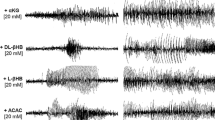Abstract.
In rat hippocampal slices superfused with magnesium-free buffer, glutamate (1 mM) caused the release of large amounts of choline due to phospholipid breakdown. This phenomenon was mimicked by N-methyl-d-aspartate (NMDA) in a calcium-sensitive manner and was blocked by NMDA receptor antagonists such as MK-801 and 7-chlorokynurenate. The NMDA-induced release of choline was not caused by activation of phospholipase D but was mediated by phospholipase A2 (PLA2) activation as the release of choline was accompanied by the formation of lyso-phosphatidylcholine (lyso-PC) and glycerophospho-choline (GPCh) and was blocked by 5-[2-(2-carboxyethyl)-4-dodecanoyl-3,5-dimethylpyrrol-1-yl]pentanoic acid, a PLA2 inhibitor. Bilobalide, a constituent of Ginkgo biloba, inhibited the NMDA-induced efflux of choline with an IC50 value of 2.3 µM and also prevented the formation of lyso-PC and GPCh. NMDA also caused a release of choline in vivo when infused into the hippocampus of freely moving rats by retrograde dialysis. Again, the effect was completely inhibited by bilobalide which was administered systemically (20 mg/kg i.p.). Interestingly, convulsions which were observed in the NMDA-treated rats were almost totally suppressed by bilobalide. We conclude that release of choline is a sensitive marker for NMDA-induced phospholipase A2 activation and phospholipid breakdown. Bilobalide inhibited the glutamatergic excitotoxic membrane breakdown both in vitro and in vivo, an effect which may be beneficial in the treatment of brain hypoxia and/or neuronal hyperactivity.
Similar content being viewed by others
Author information
Authors and Affiliations
Additional information
Electronic Publication
Rights and permissions
About this article
Cite this article
Weichel, O., Hilgert, M., Chatterjee, S. et al. Bilobalide, a constituent of Ginkgo biloba, inhibits NMDA-induced phospholipase A2 activation and phospholipid breakdown in rat hippocampus. Naunyn-Schmiedeberg's Arch Pharmacol 360, 609–615 (1999). https://doi.org/10.1007/s002109900131
Received:
Accepted:
Issue Date:
DOI: https://doi.org/10.1007/s002109900131



